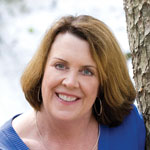 When Mary Wyatt ’74, American studies, was a little girl, she loved to retreat to a secret space in her backyard. There, in a patch of grass surrounded by a grove of apple trees, she spent lazy summer days lying on her back and gazing up at the passing clouds. Flash forward to the present day, where the concept behind Wyatt’s favorite childhood ritual – connecting to nature in a ‘sacred’ space – plays a central role in the organization for which she serves as executive director.
When Mary Wyatt ’74, American studies, was a little girl, she loved to retreat to a secret space in her backyard. There, in a patch of grass surrounded by a grove of apple trees, she spent lazy summer days lying on her back and gazing up at the passing clouds. Flash forward to the present day, where the concept behind Wyatt’s favorite childhood ritual – connecting to nature in a ‘sacred’ space – plays a central role in the organization for which she serves as executive director.
While the parallels between Wyatt’s favorite childhood indulgence and her current job may be pure coincidence, she insists that the ties between her education at UMBC and her professional life are not. As an American studies major, Wyatt indulged in an array of interests – literature, history, music, sociology, art, pop culture – all related to the experience of being an American.
“It infected me with a desire to do something with my life that would really make a difference – in a place where I could actually make a ripple, here in America,” she says.
Although it would be almost two decades and a number of jobs (including positions in property management in Annapolis and in finance with the Rouse Company), Wyatt never lost sight of her aspiration.
In 1992, after a hiatus from the workplace to take care of her children, Wyatt decided she was ready to return to the workforce full-time. A quirky job advertisement in a local newspaper caught her eye. It began: “Renaissance man seeking assistant with good communication skills…”
Wyatt found herself employed by Tom and Kitty Stoner, husband and wife entrepreneurs interested in launching a private foundation whose focus, when Wyatt met them, wasn’t entirely clear. “They knew they wanted to do something that had to do with the environment, and the healing power of nature,” she says.
For the next few years, Wyatt and her new employers researched established foundations whose goals and objectives they respected. Then, they went on a weekend-long retreat in Vermont. In a whirlwind brainstorming session, the three of them drafted a mission statement, a vision statement, and a business plan for what would become the TKF Foundation.
The TKF Foundation, a private grant-making foundation, formed in 1996 on the premise of inspiring and creating “open spaces, sacred places” – open, that is, to people from every culture, religion, and economic background, explains Wyatt.
Since its launch, the TKF Foundation has funded over 100 “open spaces, sacred places” projects and supported scores of neighborhood-level greening projects in Baltimore, Anne Arundel County, and Washington, D.C. Of the many proposals it receives annually, the foundation chooses organizations that best share its vision: the creation of ‘sacred spaces’ for the purpose of facilitating an increased sense of community and deepening human connections.
At the helm of each of these projects is someone the TKF Foundation considers a “firesoul,” a person whose passion and vision serve as the driving forces behind the creation of a public green space where users might find respite, even an antidote, to an otherwise stressful and sometimes isolating world. “We look for kindred spirits,” Wyatt says.
Though Wyatt resists naming a favorite sacred space, she believes some of the foundation’s projects have made a considerable impact on their target communities.
One is a garden recently created at the Maryland Correctional Institute at Jessup. “To see these guys in prison grow something from seed, it’s amazing,” Wyatt says.
Another TKF-funded project Wyatt finds particularly inspirational is a garden in the unassuming fenced backyard of a rowhouse on Baltimore City’s Belvedere Avenue, which houses the nonprofit Advocates for Survivors of Torture and Trauma. “They get here [to Baltimore], find a room somewhere, and are afraid to come out. This helps them reinvent their lives,” says Wyatt, noting that the garden not only has brought some clients out of hiding, but also has encouraged them to grow vegetables they once ate in their native lands.
Having established over 100 thriving sacred spaces regionally for diverse clients – hospitals, schools, jails and beyond – the TKF Foundation is now embarking on its next and perhaps final phase.
In addition to continuing to support existing regional partners through 2015, the foundation plans to fund up to five new sacred spaces nationwide. Each of these projects would serve as a demonstration and research site to study the impact of nature on the human spirit.
“The research will prove what we [at TKF] believe – that nature is sacred,” Wyatt says.
— Elizabeth Heubeck ’91
Tags: Mary Wyatt, Winter 2011

